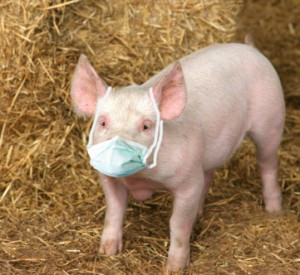BREAKING NEWS! COVID-19-Livestock: Contrary To Previous Studies, Canadian Study Shows That Pigs Are Susceptible TO SARS-CoV-2
Source: COVID-19-Livestock Sep 12, 2020 5 years, 3 months, 1 week, 3 days, 22 hours, 3 minutes ago
COVID-19-Livestock: A new study by the Canadian Food Inspection Agency-Manitoba involving researchers from University of Manitoba and also from the Iowa State University-U.S. has found that pigs are also susceptible to the SARS-CoV-2 coronavirus. The study results could have a magnitude effects on the livestock industry and also has implications on zoonotic transmissions and potential induced mutations between species.

The study findings are published on a preprint server are current being peer-reviewed.
https://www.biorxiv.org/content/10.1101/2020.09.10.288548v1
The SARS-CoV-2 coronavirus, the agent responsible for COVID-19 has been shown to infect a number of species. The role of domestic livestock and the risk associated for humans in close contact remains unknown for many in the domestic livestock farming industry.
The determination of the susceptibility of pigs to SARS-CoV-2 is critical towards a One Health approach to manage the potential risk of zoonotic transmission.
In this study, the researchers demonstrated pigs are susceptible to SARS-CoV-2 following oronasal inoculation. Viral RNA was detected in group oral fluids and nasal wash from at least two animals while live virus was isolated from a pig.
Significantly, antibodies could be detected in two animals at 11 and 13 days post infection, while oral fluid samples at 6 days post inoculation indicated the presence of secreted antibodies.
Study Finding Details: The results presented in this study define domestic swine as a susceptible species albeit at low levels to SARS-CoV-2 viral infection. One animal was found to retain live virus, while two additional animals had detectible RNA measured in the nasal wash, and two pigs developed antibodies. In total, of the sixteen animals experimentally inoculated, five displayed some level of exposure or elicited an immune response to the virus, representing roughly 30% of the study cohort. One pig displayed mild, non-specific clinical signs, including coughing and depression in addition to multiple pigs demonstrating mild ocular and nasal discharge. These signs occurred during what could be considered to be the immediate, post-infection period. Over a nine day period, between cessation of clinical signs and post mortem evaluation, the virus was found to be maintained undetected in the submandibular lymph node in this animal.
Importantly, of the five animals indicated potential infection, viral RNA was only detected at low levels and no live viral shedding was identified. Following the detection of viral RNA in group oral fluids collected by rope chews at 3 DPI, the presence of secreted antibody was detected using a surrogate virus neutralization test (sVNT) at 6 DPI in the same sample type. The amount of antibody measured in oral fluids from swine would be considered below a protective cutoff based on comparisons to classical neutralizing titers; however the discovery of secreted antibody in oral fluids may be a useful tool for surveillance efforts. This also demonstrates the possibility that human saliva should also be evaluated as a less invasive method to provide accompanying evidence with serosurveillance studies for exposure to SARS-CoV-2.
These study findings and data highlight the need for additional livestock
assessment to determine the potential role domestic animals may contribute towards the ongoing SARS-CoV-2 pandemic.
The study results contradict previous reports indicating swine are not susceptible to SARS-CoV-2 infection
https://www.ncbi.nlm.nih.gov/pmc/articles/PMC7164390/ and
https://pesquisa.bvsalud.org/global-literature-on-novel-coronavirus-2019-ncov/resource/en/covidwho-635706
In those studies viral RNA was not detected using nasal swabs or organ samples and no seroconversion was measured and viral loads used were minimal.
The researchers in this study say infectious dose, viral isolate, age, and breed or colony of swine may affect study outcomes. It should be noted in this study, a ten-fold higher viral dose was utilized for experimental infection compared to previous studies.
Moreover, the animals were obtained from a high health status farm in Manitoba, in contrast to a specific pathogen free colony, for the purpose of determining the risk to typical Canadian pig livestock.
Altogether, these study findings indicate that further investigations into the susceptibility of additional domestic livestock species should be studied to assess their risk.
Finally, the research team emphasize that no cases of domestic livestock have been documented by natural infection to date; however, the results of this study support further investigations in to the role that animals may play in the maintenance and spread of SARS-CoV-2.
At the moment there is no additional data, studies or research showing what other possible implications these study findings could have in terms of the meat and pork and also food industry ie from slaughter houses, to meat processing plants to retail supermarkets etc.
It is also highly suspicious when one looks into the earlier studies and also the agencies involved that were quick to claim that the pig, beef, goat livestock and poultry industries were not affected by the SARS-CoV-02 coronavirus despite weak studies. One ‘health organization’ in particular has a track record of disseminating fake news and misinformation on the COVID-19 disease since the beginning and has put millions at risk but till now has not suffered any penalties or legal punishments.
For more on
COVID-19 Livestock, keep on logging to Thailand Medical News.
